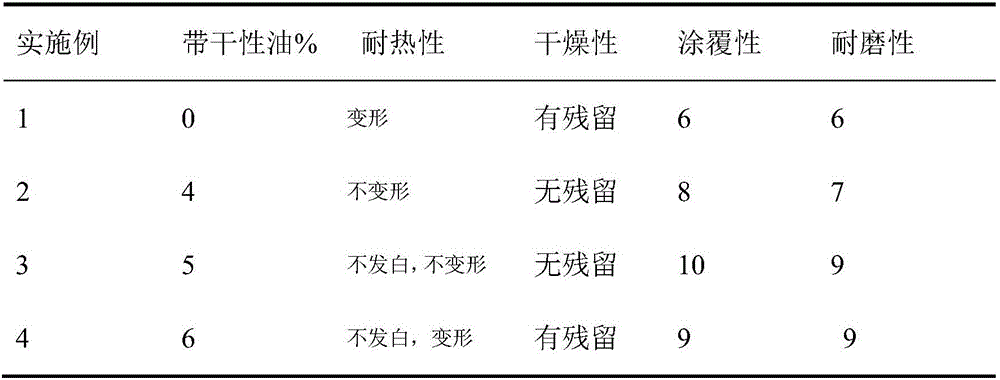Preparation method of biobased water-borne UV (ultraviolet) curing environment-friendly nail polish
A bio-based, nail polish technology, applied in the field of material chemistry, can solve the problems of life and health and environmental threats, not being environmentally friendly, non-toxic, human health hazards, etc., achieving good transparency, fast curing speed, and good adhesion.
- Summary
- Abstract
- Description
- Claims
- Application Information
AI Technical Summary
Problems solved by technology
Method used
Image
Examples
Embodiment 1
[0034] A preparation method for bio-based water-based UV curing environment-friendly nail polish, comprising the following steps:
[0035] 1) By mass percentage, weigh 8% of oligomer polyol, 6% of dry vegetable oil, 45% of diisocyanate compound, 1.2% of trimethylolpropane, 2% of hydrophilic chain extender, and 4.5% of reactive diluent %, neutralizing salt-forming agent 3%, water-based photoinitiator 0.1% and deionized water 30.2%;
[0036] 2) Add oligomer polyol and drying vegetable oil to the reactor and dehydrate in vacuum at 110° C. for 2 hours to obtain mixture a; add diisocyanate compound, trimethylolpropane, hydrophilic chain extender and solvent to mixture a, React at 60°C for 4 hours to obtain prepolymer b;
[0037] Wherein, the quality of solvent is 33% of the total mass of oligomer polyol, vegetable oil with dryness, diisocyanate compound, trimethylolpropane and hydrophilic chain extender;
[0038] The oligomer polyol is polycaprolactone diol;
[0039] The describ...
Embodiment 2
[0055] A preparation method for bio-based water-based UV curing environment-friendly nail polish, comprising the following steps:
[0056] 1) By mass percentage, weigh 22% of oligomer polyol, 4% of dry vegetable oil, 20% of diisocyanate compound, 2.4% of trimethylolpropane, 10% of hydrophilic chain extender, and 4.5% of reactive diluent %, neutralizing salt-forming agent 5%, water-based photoinitiator 0.3% and deionized water 31.8%;
[0057] 2) Add oligomer polyol and drying vegetable oil to the reactor and dehydrate in vacuum at 120° C. for 1 hour to obtain mixture a; add diisocyanate compound, trimethylolpropane, hydrophilic chain extender and solvent to mixture a, React at 90°C for 1 hour to obtain prepolymer b;
[0058] Wherein, the quality of solvent is 33% of the total mass of oligomer polyol, vegetable oil with dryness, diisocyanate compound, trimethylolpropane and hydrophilic chain extender;
[0059] The oligomer polyol is polytetrahydrofuran diol;
[0060] The desc...
Embodiment 3
[0076] A preparation method for bio-based water-based UV curing environment-friendly nail polish, comprising the following steps:
[0077] 1) By mass percentage, weigh 8% of oligomer polyol, 4.8% of dry vegetable oil, 20% of diisocyanate compound, 2% of trimethylolpropane, 2% of hydrophilic chain extender, and 5% of reactive diluent %, neutralizing salt-forming agent 3%, water-based photoinitiator 0.2% and deionized water 55%;
[0078] 2) Add oligomer polyol and drying vegetable oil to the reactor and dehydrate in vacuum at 110°C for 1.5h to obtain mixture a; add diisocyanate compound, trimethylolpropane, hydrophilic chain extender and solvent to mixture a , reacted at 70°C for 3 hours to obtain prepolymer b;
[0079] Wherein, the quality of solvent is 33% of the total mass of oligomer polyol, vegetable oil with dryness, diisocyanate compound, trimethylolpropane and hydrophilic chain extender;
[0080] The oligomer polyol is a mixture of polycarbonate diol and polyhexamethyl...
PUM
 Login to View More
Login to View More Abstract
Description
Claims
Application Information
 Login to View More
Login to View More - R&D
- Intellectual Property
- Life Sciences
- Materials
- Tech Scout
- Unparalleled Data Quality
- Higher Quality Content
- 60% Fewer Hallucinations
Browse by: Latest US Patents, China's latest patents, Technical Efficacy Thesaurus, Application Domain, Technology Topic, Popular Technical Reports.
© 2025 PatSnap. All rights reserved.Legal|Privacy policy|Modern Slavery Act Transparency Statement|Sitemap|About US| Contact US: help@patsnap.com

